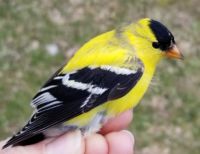New research stories from McGill University.

Using artificial intelligence to study the social impact of disruptive weather events
Does a “disruptive weather event” imply extreme weather? Not necessarily, say two McGill University researchers. Instead of focusing on social impacts, weather research tends to focus on meteorology.
“This influences how we prepare for weather-related upheaval. We want to break that circularity by adding the social dimension of the problem,” says Renee Sieber, Professor in the Bieler School of Environment and Department of Geography.
“Sometimes, a few ill-timed centimeters of snow can create more havoc than a massive storm,” says Professor Frédéric Fabry of the Bieler School and Department of Atmospheric and Oceanic Sciences. “As the global climate crisis worsens, would we prefer to be warned about disruptive rather than extreme weather? And what makes a weather event disruptive?”
Why do we feel vulnerable to some weather and not others?
The researchers’ project, “Breaking the equation ‘disruptive weather events are extreme ones’ with artificial intelligence and social narratives from the past and present”, has been awarded an Audace Grant by the Government of Quebec.
It will analyze past and present social responses to disruptive weather (delays, anxieties, and preparation) across traditional newspapers and social media, using an aspect of artificial intelligence (AI) called “natural language processing,” which trending algorithms adopt to identify concepts from words. This will help the researchers assess what renders us vulnerable to some events and resilient to others.
“We will gain a better understanding of people’s perception of their vulnerabilities and their resilience,” concludes Fabry. “We want to shift the study of disruptive weather to focusing on the people affected by those events, by listening to their voices.”

High levels of flame retardants in urine raise health concerns for men
Scientists from McGill University and Health Canada have found flame retardants in the urine of more than 95% of young men examined in greater Montreal during a study with approximately 120 participants. These results raise concerns about male reproductive health by making a link between exposure to chemicals known as esters found in flame retardants and plasticizers and hormone levels or semen quality.
Organophosphate esters are chemicals that are added to cell phones, computers, clothes, cosmetics, and furniture for their properties as flame retardants and plasticizers. But they leach out of these products, raising health concerns.
“Exposure to elevated levels of some of these chemicals is associated with altered hormone levels and effects on sperm concentrations and motility, suggesting that they may affect male reproduction,” said Barbara Hales, a professor in the Department of Pharmacology and Therapeutics at McGill University and the senior author on the recent study. “The next step in the research will be to develop approaches to identify responsible replacements for this family of chemicals.”
“Exposure of men living in the greater Montreal area to organophosphate esters: Association with hormonal balance and semen quality” by Shabana Siddique et al. was published in Environment International.







